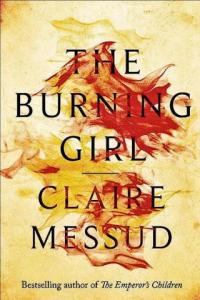 ‘The Burning Girl’ by Claire Messud tells the story of Julia Robinson and her friendship with Cassie Burnes during their childhood growing up in the small Massachusetts town of Royston. After meeting at nursery, they are inseparable throughout school but looking back years later, Julia remembers the circumstances which led to them drifting apart.
‘The Burning Girl’ by Claire Messud tells the story of Julia Robinson and her friendship with Cassie Burnes during their childhood growing up in the small Massachusetts town of Royston. After meeting at nursery, they are inseparable throughout school but looking back years later, Julia remembers the circumstances which led to them drifting apart.
It is inevitable that any literary fiction about the nuances of female friendship in late childhood will now be compared to My Brilliant Friend by Elena Ferrante, particularly when one character is dominant and outgoing (Lila/Cassie) while the other is awkward, lacks self-confidence and mostly lives in the shadow of their captivating friend (Elena/Julia). Like the first book in the Neapolitan Novels series, ‘The Burning Girl’ looks at the intensity of the complex and subtle power struggles that exist between girls at school but Messud’s fifth novel also focuses more on the often unspoken barriers presented by social class.
Julia and Cassie find that different expectations are placed on them by their peers and teachers based on the perceived circumstances of their home life and this divide is ultimately what separates them later in life, particularly when they develop different interests and they can no longer bond over make-believe worlds in the way that they did as children. Julia is from a stable family with educated and supportive parents whereas Cassie is a disaffected student and doesn’t get on with her mother’s sinister new partner, Dr. Anders Shute. Although Julia and Cassie’s friendship doesn’t end as explosively as the title and cover design suggests (it’s more of a slow-burn that fizzles out on its own), there is still a palpable sense of dread and injustice as the story approaches its sad conclusion when Cassie attempts to track down the man she believes is her supposedly dead father.
In a recent interview in the Guardian, Messud said: “In the last few years I have come to feel that maybe in 50 years there won’t be novels, that people won’t have the attention for it.” I don’t share such a pessimistic view of the appetites of future generations for complex narratives but the well-drawn characters of Julia and Cassie certainly sustained my interest and Messud is just as perceptive about early adolescence in ‘The Burning Girl’ as she is about women approaching middle age in her memorable rage-fest of a novel The Woman Upstairs.
Many thanks to Little Brown Book Group for sending me a review copy via NetGalley.





Your review reminds me that I was given a copy of The Woman Upstairs when it first came out and that it is still languishing unread on my shelves. Not that there is anything unusual in that but it was a book I was glad to receive and one I really did intend to get round to. Now it looks as if I had better read both of them.
LikeLike
I think The Woman Upstairs is more powerful but The Burning Girl is also effective in its own way. Hope you enjoy them!
LikeLike
Very much looking forward to reading this. Like you, I don’t share Messud’s pessimism re the complex novel. Humans have long been telling each other stories, well before the written word, and I see no reason why that should stop.
LikeLike
I agree, I think our appetite for binge-watching box-sets and binge-reading suggests otherwise!
LikeLike
Which just adds to my frustration at the very strange Man Booker shortlist, if they were not going to shortlist prize-winning novels, then this is just the sort of title that should have been considered for the longlist instead
LikeLike
Yes, I mentioned The Burning Girl in my predictions list as I had just finished it at the time. Admittedly, it’s not as ambitious as lots of other recent novels but I think it is very effective in its own way.
LikeLike
I feel like EVERYONE is reading this book at the moment (the publicists will get their Christmas bonus!). Must get my hands on a copy…
LikeLike
Yes, it’s worth checking out if you can!
LikeLike
Great review!
LikeLiked by 1 person
Pingback: The Women’s Prize for Fiction 2018 Longlist Predictions | A Little Blog of Books